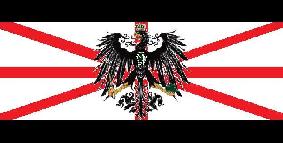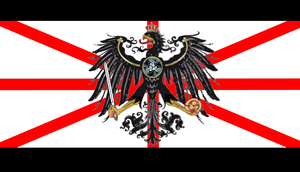Glorious Banner
This article or section marked as work-in-progress has not been edited in over seven days, but further work is required. Please notify the user who first added this template. |
The "Glorious Banner' was the official name for Aynvaul's 'Imperial' or 'High Government' flag designs from 2006-2022. They took design inspirations from various sources such as the Holy Roman Empire, Prussia, England, Ireland, and Scotland. It's a design tradition that has been with Aynvaul since at least 2006. The very first completed physical example is currently in the collection of Long Island micronationalist Gordon Robert Charles Gray III and is affectionately called "The Glorious Banner". The design tradition was used from 2006 to 2021 in official capacity, it was gradually phased out and replaced by the modern cultural flag which offers a much more simple design for printing. After the January 6th insurrection in the United States interest in the Aynvaul micronation increased and the cultural flag was voted on by the Spring 2021 moot to fully replace the Glorious Banner designs in all official capacities. In a later moot, the Glorious Banner was given a designation to signify the Impire's presence in camps and facilities but the flag series would otherwise be retired. The 2019 and final variant still remains available for print as an historical Aynvallic design.

Display usage and Decline
For most of its history, the Glorious Banner served as a ceremonial symbol. It was rarely displayed year round except inside private dwellings, when it was flown outdoors it was usually to commemorate a special event or meeting. Typically they were displayed on walls as banners hence their name "Glorious Banner". From 2019 onward they would be used to mark an in-session moot before being phased out with the cultural flag after 2020.
Much like the US flag, these flags had various signaling usage such as showing distress when flown upside-down. The overall design allowed such an upside-down orientation too subtle to all but the keen observer, which would of helped with such a discreet message.
After the January 6th Insurrection in the United States, an increase in attendance of Aynvaul's moots saw concerns over new members' impression of the Prussian inspired flag. Ace Diplomat John Farley made the motion to ascend the cultural flag to official status with backing by Ace General Sir Daniel Altoonian.
| Flag | Dates in Use | Duration | Description |
|---|---|---|---|
 |
2006-2011 | ~5 Years | The first iterations of Aynvaul's "Glorious Banner" these flags were typically drawn individual on large construction paper or cloth by hand. Due to the nature of how they were made they often varied from one to another and only one example is known to still exist and it is held in the Impire's personal archival collection. Despite the nature to their variety there was something of a standard design in practice. Featuring a white background surrounded by a thick black border, inside was a european imperial eagle often holding two swords one in each wing. Behind this eagle were thin red striped crossing diagonally, vertically, and horizontally intersecting around where the eagle's heart would be. The eagle would often be perched or holding up a large golden star. |
 |
2011 - ~2013 | ~2 years | In 2011 in an attempt to be easier with ink, a simplification was made to base the new "Glorious Banner" designs around the Prussian flags. These versions were often of lower resolutions. |
 |
2013 - February 2015 | ~1 year 2 months | With better drawing programs, higher resolution versions were made. This version was the first to include the Aynvaul Block, a relic of significance to the Impire, in its design. |
 |
February 2015 - December 2017 | 1 year 10 months | Glorious Banner design used by the AIG circa 2016. |
 |
December 2017 - 2019 | ~ 1 years 1 month | Glorious Banner design used by the AIG circa 2016. First edition to include the suns since the 2010 version. |
 |
2019-2022 | ~3 years | The last design of the "Glorious Banner" tradition, this design was made for vector conversion by Yaroslav Mar to be printed by MicroFlags, it remains the only design from this tradition available for professional printing. |